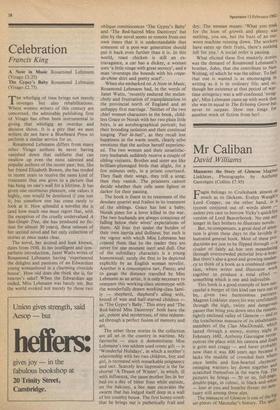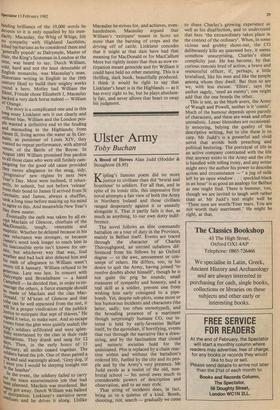Mr Caliban
David Williams
Massacre: the Story of Glencoe Magnus Linklater, Photographs by AnthonY Gascoigne (Collins £7.95) Elagin belongs to Cruikshank almost as
much as to Dickens. Evelyn Waugh 's Lord Copper, on the other hand, is a tycoon conjured out of words alone -- unless you care to borrow Vicky's quickfire version of Lord Beaverbrook. No one anY longer in fact bothers to illustrate novels.
But, to compensate, a great deal of atten- tion is given these days to the lavishly Il- lustrated general book. Most of these pro- ductions are just to be flipped through -- a rivulet of fairly ad hoc text meandering through overcrowded pictorial brit-a-brae' But there's also a good and growing tenden- cy to think of a book as a combined opera- tion, where writer and illustrator work together to produce a total effect -- something which is one and indivisible.
This book is a good example of how suc- cessful a merger of this kind can turn out to be, given two harmonious partners. Magnus Linklater steers his way confidently through the high, twisty and dangerous passes that bring you down into the remote, tightly enclosed valley of Glencoe — and to the treacherous massacre of its inhabitants, members of the Clan MacDonald, wine)/ lasted through a snowy, stormy night In February 1692. Anthony Gascoigne recon- noitres the place with his camera and find, s it grim and craggy — and barer probably now than it was 300 years ago because It lacks the muddle of crowded huts where once lambs and lion-hearted clayril°re; swinging warriors lay down together anu scratched themselves in the warm fug. The pictures he brings — 50 or so, full-page' double-page, in colour, in black-and-white lour at you and breathe threat: no sanc- tuary still among these alps. The massacre of Glencoe is one of the h!ig.. set-pieces of Macaulay's history. The Wel binding brilliance of the 10,000 words he devotes to it is only equalled by his men- dacity. Macaulay, the Whig of Whigs, felt no sympathy with Highland Jacobites, kilted barbarians as he considered them and 'generally popish' as Dalrymple, Master of Stair, the King's Scotsman in London at the time, was heard to say. Dutch William, cold, hard and not the least detestable of English monarchs, was Macaulay's man. Historians writing in English in the 19th century liked to build their mighty works round a hero. Motley had William the Silent, Froude chose Elizabeth I, Macaulay backed a very dark horse indeed — William of Orange. The story is a complicated one and in this long essay Linklater sets it out clearly and without bias. William and the London peo- Pie wanted a definitive end to the feuding and marauding in the Highlands; from James II, living across the water at St Ger- main, as pensioner of Louis XIV, they wanted no repeat performance, with altered venue, of the Battle of the Boyne. In August 1691 William promised free pardon to all those clans who were still futilely cam- P,_algoing for the good old cause provided they swore allegiance to the snug, tidy, Progressive' new regime by next New Year's Day. Most were inclined, if reluct- antly, to submit, but not before 'release' 'torn their bond to James II arrived from St Germain; and James, always a shuffler, took a long time before making up his mind to agree to this. And meanwhile New Year's Day drew nearer. Eventually the oath was taken by all ex- cept Maclain of Glencoe, chieftain of the macDonalds, tough, venerable and majestic. Whether he delayed because in his case reluctance was stronger, or because 111es's word took longer to reach him in ,..1s, Inaccessible eyrie isn't known for cer- 'tin, but whichever way that was, foul weather and bad luck also delayed him and "Is oath of allegiance to William wasn't sWorn till 6 January. William refused to be fherous. Late was late. In concert with Dalrymple and Breadalbane — a hated Abell — he decided that, in order to en- cboeurage the others, a fierce example should D Made of Maclain and the clan Mac- onald. 'If M'kean of Glencoe and that tube can be well separated from the rest, it will be a proper vindication of the publick Stlee to extirpate that sept of thieves.' He Signed it twice, to make sure. And so escape routes from the glen were quietly sealed; the tiking's soldiers infiltrated and were splen- Lloly entertained by the clan in their rude cillabitations. They drank and sang for 12 pan- Then, in the early hours of 13 sr,e,u21-1. arY, all smiles ceased together. The doe and hated the job. One of them patted a and said warningly aloud, 'Grey dog, if you I would be sleeping tonight out the heather'. In the event, the soldiery failed to carry ubeenilt the mass extermination job that had planned. Maclain was murdered. But 1;f411Y got away. Dutch William was balked o' extirpation. Linklater's narrative never confuses and he drives it along. Unlike Macaulay he strives for, and achieves, even- handedness. Macaulay argued that William's 'extirpate' meant in Scots no more than the burning of crops and the driving off of cattle. Linklater concedes that it might at that date have had that meaning for MacDonald or for MacCallum More but rightly insists that then as now ex- tirpation meant genocide and for William it could have held no other meaning. This is a thrilling, dark book, beautifully produced. I think it would be right to say that Linklater's heart is in the Highlands — as it has every right to be, but he plays absolute- ly fair, and never allows that heart to sway his judgment.











































 Previous page
Previous page